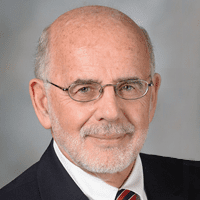Titles and Affiliations
Paul and Mary Haas Chair in Genetics
Chief, Molecular Hematology and Therapy
Professor of Medicine, Department of Leukemia
Professor of Medicine, Department of Stem Cell Transplantation
Research area
Improving treatments for advanced triple negative breast cancer.
Impact
Until recently, triple-negative breast cancer (TNBC), an aggressive and hard-to-treat subtype, had few, if any, targeted treatment options. Thanks to the tireless efforts of researchers, the number of therapies available for TNBC is now steadily growing. Chemotherapy remains the primary treatment approach, but its efficacy is limited due to the presence of specialized cancer stem-like cells—resilient tumor cells capable of surviving therapy and driving tumor regrowth and metastasis. Dr. Andreeff aims to develop innovative treatments to inhibit TNBC by targeting two specific molecules present on cancer cells: GD2 and Trop-2. GD2 is highly expressed in breast cancer stem cells, making it a valuable target for therapies designed to eliminate the cells that conventional treatments miss. Trop-2 is broadly expressed in TNBC and has already shown clinical relevance as a therapeutic target.
Progress Thus Far
The team’s prior research has shown that GD2-positive breast cancer cells significantly contribute to treatment resistance and that targeting GD2 with the antibody drug naxitamab (Danyelza®) effectively enhances immune responses against these aggressive cells. In addition, the antibody-drug conjugate sacituzumab govitecan (SG, Trodelvy®), a Trop-2–directed antibody-drug conjugate, is FDA-approved for patients with advanced TNBC and has demonstrated improved outcomes in clinical trials.
What’s next
In this upcoming year, Dr. Andreeff and his team plan to combine naxitamab with SG to improve treatment efficacy by simultaneously attacking multiple vulnerabilities within cancer cells. They will evaluate how effectively this combination eliminates cancer cells using advanced technologies and models derived from patient tumors. They will further investigate how this combined therapy affects tumor growth, metastasis, and the cancer cells’ ability to survive and grow. Their studies will assess treatment response and uncover resistance mechanisms to enable more precise and effective therapies for TNBC.
Biography
Michael Andreeff MD, PhD received his advanced degrees from the University of Heidelberg, Germany, and additional training at Memorial Sloan Kettering Cancer Center. He has been a pioneer in flow cytometry since 1971, when he established the first flow cytometry laboratory at the University of Heidelberg and organized the first European flow cytometry conference. In 1977 he joined MSKCC, became head of the Leukemia Cell Biology and Hematopathology flow cytometry laboratory, and organized the first Clinical Cytometry Conference in 1986. Since 1990 he has been Professor of Medicine at MD Anderson Cancer Center where he holds the Paul and Mary Haas Chair in Genetics. He has published over 450 peer-reviewed papers, 5 books and 75 book chapters.
Dr. Andreeff’s group has worked extensively on drug resistance in hematopoietic malignancies and breast cancer and developed or co-developed several new therapeutic agents including the novel triterpenoids CDDO and CDDO-Me and Bcl-2- , XIAP- , surviving-, MEK- and HDM2- inhibitors. Over the last decade, his group has made major contributions to the understanding of micro-environment-mediated drug resistance and developed strategies to exploit the underlying mechanisms for the treatment of hematopoietic and epithelial malignancies. His group reported the role of bone marrow-derived multipotent mesenchymal stromal cells (MSC) in tumor stroma formation and developed therapeutic strategies based on this discovery.






